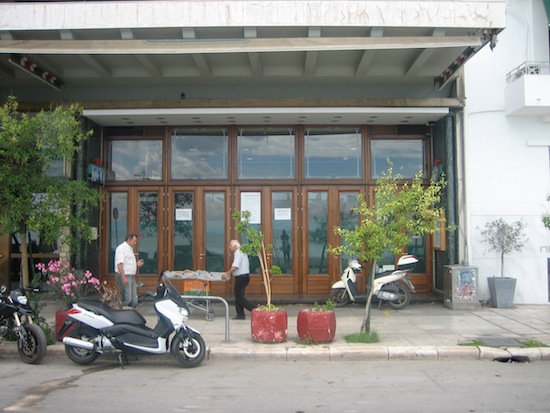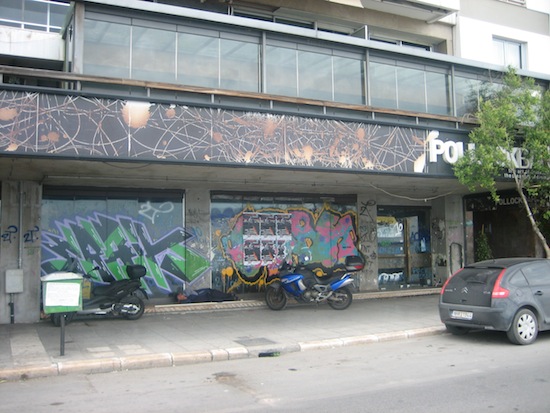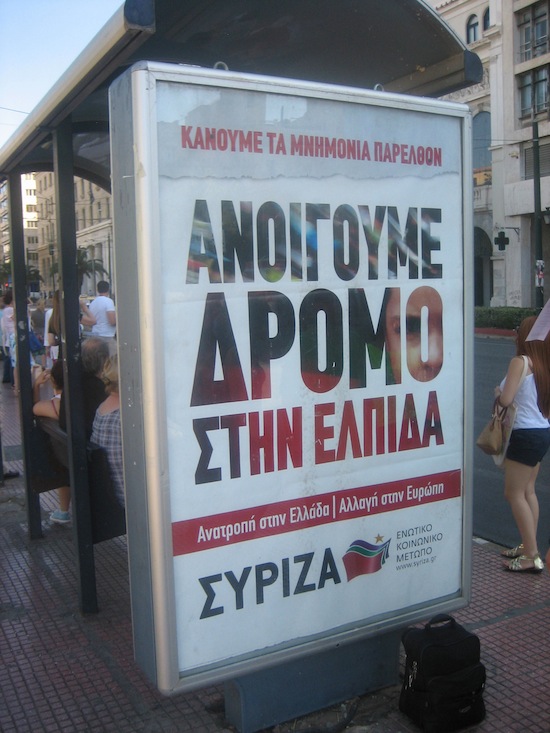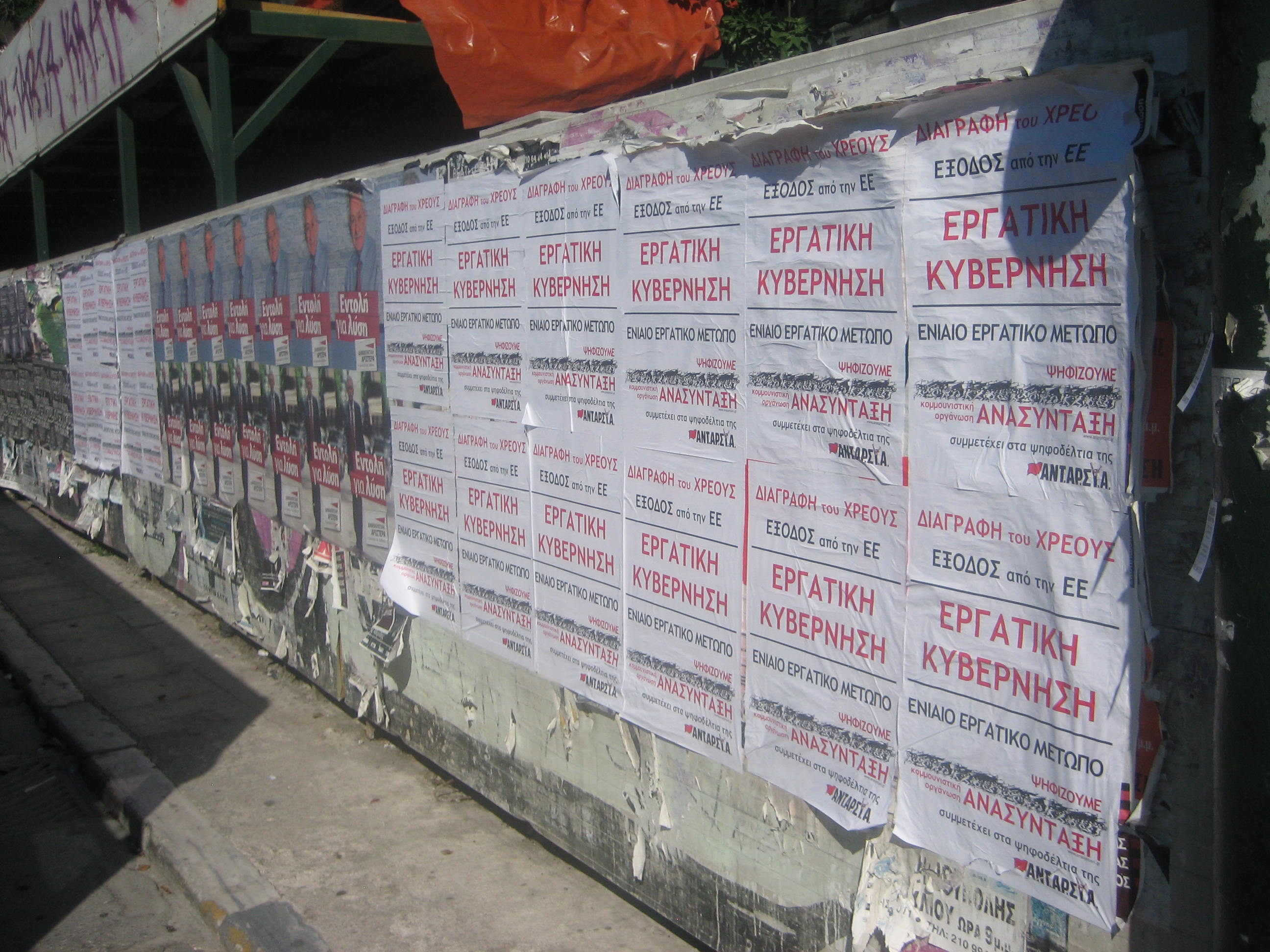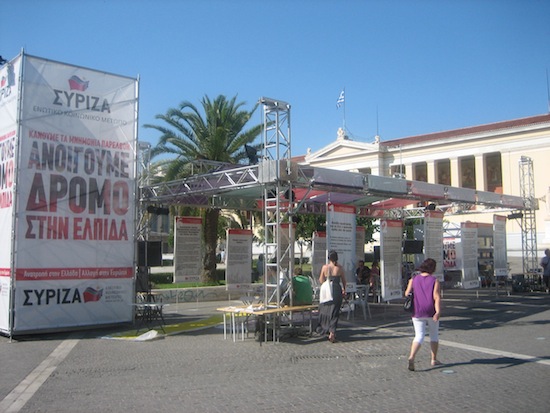Chaos. This Greek word aptly describes the climate surrounding Greece over the past several weeks, at least if the Greek and international media are to be believed. In the weeks leading up to the parliamentary elections of May 6, and the upcoming elections of June 17, the climate that has been cultivated by the media has been one of polarization and fear. Unelected bureaucrats from the European Union and politicians from Germany, France and elsewhere have repeatedly issued stern warnings about the cataclysm that will follow if Greek voters do not elect the "right" parties. Meanwhile, Greek television has featured an endless parade of candidates appearing on talk shows and in unofficial debates, while commentators continuously warn voters of the consequences of not making the correct choice on June 17.
Shuttered businesses, such as this storefront in Thessaloniki, have appeared throughout Greece over the past two years, as the economic austerity policies imposed on Greece have led to reduced incomes, increased unemployment, and much less consumer spending.
This polarized climate was exemplified by the now-infamous incident involving Ilias Kasidiaris, a member of the far-right Golden Dawn political party, who slapped longtime Communist Party MP Liana Kanelli on live television. This is but one example of the polarization seen in Greece, however. Since the elections of May 6th, campaign dialogue has consisted of a number of odious "either-or" scenarios for Greek voters, such as a choice between the Euro and the drachma, between Greece remaining in the E.U. or abandoning Europe, and between austerity and an alternate path forward for the country. With most of the major media outlets in Greece being openly pro-memorandum, this has resulted in skewed coverage that has sought to manipulate public opinion. An example of this was seen in the reporting of the
that found that 88 percent of respondents were in favor of Greece remaining within the Eurozone. What the media conveniently ignored was that 54 percent of respondents supported retaining the Euro only under favorable terms. International media outlets have brazenly followed suit, with the
Financial Times
recently calling for Greek voters to elect the pro-memorandum New Democracy party, instead of the left-wing Syriza political party. Foreign politicians also have not resisted the temptation to intervene: President Obama recently called on Greece to "meet its obligations," ignoring his own numerous broken campaign promises.
In the days and weeks leading up to the June 17 election, campaign posters from multiple parties have appeared on bus stops, walls, and lampposts all throughout Greece.
While Greek voters are being terrorized about the choice that they are to make on Sunday and criticized for not electing a "pro-Europe" party outright on May 6th, Greek political parties were admonished by international commentators for not forming a unity government. This ignores the fact that these same "pro-Europe" political parties are the ones which helped lead the country to its present state. It overlooks the fact that last year, Belgium set a record for most consecutive days (535) without a government. It ignores the fact that an unelected government led by former banker Mario Monti remains in power in Italy, and it ignores the problems that we have faced in the United States, such as in 2000 -- when it took months of recounts and a Supreme Court decision in order for the loser to be named the winner of the presidential elections.
A Syriza campaign booth in central Athens.
Lost within the cacophony of voices that are chastising Greece and its voters, is the will of the Greek people, and the significance of the choices that they have already made. In October 2009, the two longstanding political powers, PASOK and New Democracy, received 77.4 percent of the vote. On May 6th, that percentage nosedived to 32 percent, shattering the two-party system and discrediting most pre-election polls. While commentators claimed that Greek voters sent a signal in favor of "unity" across the political spectrum, in my opinion, the message was clear: Greek voters want change. Greek voters are tired of the scaremongering, tired of being portrayed as the poster-child for the ills of Europe and tired of the broken promises made by the "major" parties. They are tired of the promises that were made by the EU and IMF that the austerity measures would bring growth in 2012... or 2013... or perhaps in 2015, or that the measures would not affect the poorest members of society, as the IMF's Poul Tomsen claimed in an interview with Greek newspaper Kathimerini in May 2010. And while many Greek voters may desire political unity, such unity is undesirable if it means continuing the failed policies that have led to sharp reductions in salaries and pensions and skyrocketing taxes and unemployment. On June 17, the Greek voters will make perhaps the most important decision in the country's history, and while they are being warned about the chaos that will follow if they do not vote in the "proper" manner, the true chaos has already occurred: with the wholesale destruction of an entire economy, with the democratic deficit of the European Union becoming openly evident, and with the less-than-veiled efforts to instill fear in voters. It is this chaos that Greek voters will have an opportunity to end on June 17.
Our 2024 Coverage Needs You
It's Another Trump-Biden Showdown — And We Need Your Help
The Future Of Democracy Is At Stake
Our 2024 Coverage Needs You
Your Loyalty Means The World To Us
As Americans head to the polls in 2024, the very future of our country is at stake. At HuffPost, we believe that a free press is critical to creating well-informed voters. That's why our journalism is free for everyone, even though other newsrooms retreat behind expensive paywalls.
Our journalists will continue to cover the twists and turns during this historic presidential election. With your help, we'll bring you hard-hitting investigations, well-researched analysis and timely takes you can't find elsewhere. Reporting in this current political climate is a responsibility we do not take lightly, and we thank you for your support.
Contribute as little as $2 to keep our news free for all.
Can't afford to donate? Support HuffPost by creating a free account and log in while you read.
The 2024 election is heating up, and women's rights, health care, voting rights, and the very future of democracy are all at stake. Donald Trump will face Joe Biden in the most consequential vote of our time. And HuffPost will be there, covering every twist and turn. America's future hangs in the balance. Would you consider contributing to support our journalism and keep it free for all during this critical season?
HuffPost believes news should be accessible to everyone, regardless of their ability to pay for it. We rely on readers like you to help fund our work. Any contribution you can make — even as little as $2 — goes directly toward supporting the impactful journalism that we will continue to produce this year. Thank you for being part of our story.
Can't afford to donate? Support HuffPost by creating a free account and log in while you read.
It's official: Donald Trump will face Joe Biden this fall in the presidential election. As we face the most consequential presidential election of our time, HuffPost is committed to bringing you up-to-date, accurate news about the 2024 race. While other outlets have retreated behind paywalls, you can trust our news will stay free.
But we can't do it without your help. Reader funding is one of the key ways we support our newsroom. Would you consider making a donation to help fund our news during this critical time? Your contributions are vital to supporting a free press.
Contribute as little as $2 to keep our journalism free and accessible to all.
Can't afford to donate? Support HuffPost by creating a free account and log in while you read.
As Americans head to the polls in 2024, the very future of our country is at stake. At HuffPost, we believe that a free press is critical to creating well-informed voters. That's why our journalism is free for everyone, even though other newsrooms retreat behind expensive paywalls.
Our journalists will continue to cover the twists and turns during this historic presidential election. With your help, we'll bring you hard-hitting investigations, well-researched analysis and timely takes you can't find elsewhere. Reporting in this current political climate is a responsibility we do not take lightly, and we thank you for your support.
Contribute as little as $2 to keep our news free for all.
Can't afford to donate? Support HuffPost by creating a free account and log in while you read.
Dear HuffPost Reader
Thank you for your past contribution to HuffPost. We are sincerely grateful for readers like you who help us ensure that we can keep our journalism free for everyone.
The stakes are high this year, and our 2024 coverage could use continued support. Would you consider becoming a regular HuffPost contributor?
Dear HuffPost Reader
Thank you for your past contribution to HuffPost. We are sincerely grateful for readers like you who help us ensure that we can keep our journalism free for everyone.
The stakes are high this year, and our 2024 coverage could use continued support. If circumstances have changed since you last contributed, we hope you'll consider contributing to HuffPost once more.
Already contributed? Log in to hide these messages.

